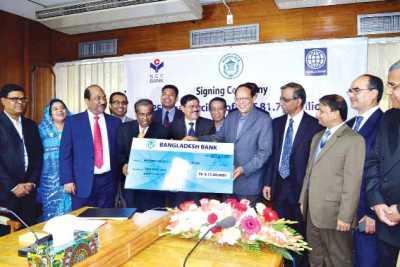The bill for Palli Sanchay Bank, a proposed specialised bank for the rural poor, will be placed in the current session of parliament for its speedy approval in the same sitting.
As per the bill, the new bank will emerge from the government’s “One House, One Farm” project, just as Grameen Bank, which was born in 1983 following the conversion of Chittagong University’s Muhammad Yunus-led project.
“The Palli Sanchay Bank bill will be placed in the current parliament session,” MA Mannan, state minister for finance, told the Dhaka Tribune yesterday.
Earlier, the cabinet on November 11, 2013 approved the draft of the Palli Sanchay Act 2013 following necessary vetting from the law ministry.
The “One House, One Farm” is a project under the Annual Development Programme (ADP), the first phase of which started in 1997. The second phase of the project started after the present government assumed power in 2009.
The government will hold 51 percent of the bank’s ownership and the remaining 49 percent would go to the 17,300 member cooperative societies of the “One House, One Farm” project.
However, the government will not take any dividends against its shares.
The draft law said the bank’s authorised capital would be Tk1,000 crore while paid-up capital Tk200 crore. The cooperative societies’ total fund of Tk1,342 crore would be transferred to the new bank.
Palli Sanchay Bank will not be governed under the Banking Companies Act, meaning it would remain mostly out of bounds of the central bank. But like Grameen Bank, it would have to submit reports as per Bangladesh Bank’s demands and its audited reports would be presented via gazette notification and placed in the parliament.
The bank’s board of directors will consist of 15 members and the secretary of the Rural Development and Cooperatives Division will be its ex-officio chairman.
Under the “One house, One Farm’’ project, a total of 35,500 societies have already been formed across the country under the project which total capital stood at Tk1,402 crore including own savings of Tk390 crore.
The members of the existing societies continued to implement income generating activities such as poultry and fish cultivation by using this fund. The number of such firms now stands at 705,000 with an investment worth Tk925 crore.
“The government has undertaken some promotional measures to create mass awareness about the project activities,’’ said an official of the “One House, One Farm” project.
The members of the societies, who would also be the member of the bank, would be eligible to get the collateral-free microcredit from the bank. However, the borrowers who want to get huge amount of loans will have to provide collateral.
The initiatives have already been taken to deposit the savings of the rural societies and utilise it properly for the development of the rural areas across the country.
News:Dhaka Tribune/08-Feb-2014




